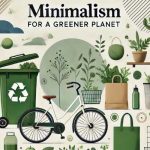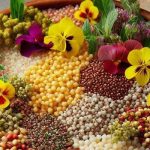In today’s world, waste has become a major environmental problem, polluting our land, air, and oceans. From plastic pollution to food waste, our daily habits contribute to overflowing landfills and increasing carbon footprints. The zero-waste lifestyle is a sustainable solution that helps minimize waste by rethinking consumption and promoting recycling, composting, and mindful usage.
This Zero-Waste Guide will help you take simple yet effective steps to reduce waste and live more sustainably.
What is a Zero-Waste Lifestyle?
A zero-waste lifestyle focuses on reducing the amount of trash that goes to landfills by following the 5 R’s of Zero Waste:
- Refuse – Say no to unnecessary items (single-use plastics, freebies, excessive packaging).
- Reduce – Buy only what you need to minimize waste.
- Reuse – Opt for reusable products instead of disposable ones.
- Recycle – Properly recycle items that cannot be refused, reduced, or reused.
- Rot – Compost organic waste like food scraps to create nutrient-rich soil.
By implementing these principles, you can significantly cut down on waste and contribute to a healthier planet.
How to Reduce Waste in Daily Life
1. Say No to Single-Use Plastics
Plastic pollution is a major environmental issue. Simple switches can help:
- Carry a reusable water bottle and coffee cup.
- Use cloth shopping bags instead of plastic ones.
- Say no to plastic straws, utensils, and packaging—opt for reusable alternatives.
- Buy in bulk to reduce packaging waste.
2. Reduce Food Waste
Food waste not only wastes resources but also contributes to methane emissions in landfills. Here’s how to cut it down:
- Plan meals and make a shopping list to avoid overbuying.
- Store food properly to extend its shelf life.
- Use leftovers creatively—make soups, smoothies, or stir-fries.
- Freeze excess food before it goes bad.
- Compost kitchen scraps instead of throwing them away.
3. Switch to Reusable Household Items
Many disposable household items have eco-friendly alternatives:
- Replace paper towels with cloth napkins.
- Use rechargeable batteries instead of disposable ones.
- Swap plastic wrap with beeswax wraps or glass containers.
- Choose bamboo toothbrushes instead of plastic ones.
4. Embrace Sustainable Fashion
Fast fashion generates a huge amount of textile waste. Reduce your clothing footprint by:
- Buying quality clothing that lasts longer.
- Shopping at second-hand or thrift stores.
- Repairing clothes instead of discarding them.
- Donating unwanted clothes instead of throwing them away.
5. Compost Organic Waste
Instead of sending food scraps to landfills, compost them to create nutrient-rich soil. Here’s how:
- Collect kitchen scraps like vegetable peels, fruit scraps, eggshells, and coffee grounds.
- Use a compost bin or start a compost pile in your backyard.
- Mix “greens” (food scraps) with “browns” (dry leaves, paper, or cardboard) for a balanced compost.
- Turn the compost regularly to speed up decomposition.
6. Reduce Electronic Waste (E-Waste)
Electronics contain hazardous materials that can harm the environment. Reduce e-waste by:
- Repairing gadgets instead of replacing them.
- Recycling old phones, laptops, and batteries at e-waste recycling centers.
- Donating old devices to charities or schools.
How to Adopt a Zero-Waste Mindset
Living a zero-waste lifestyle is about progress, not perfection. Start small and gradually make sustainable choices:
- Be mindful of what you buy – Do you need it? Is there a sustainable option?
- Support eco-friendly brands that use sustainable materials and ethical practices.
- Educate others – Share your journey and inspire friends and family to reduce waste.
- Be patient – Change takes time, but every small step counts!
Final Thoughts
Adopting a zero-waste lifestyle is one of the best ways to protect the environment. By making simple, mindful changes in our daily habits, we can reduce pollution, conserve resources, and create a healthier planet for future generations.
At NatureWale, we believe in promoting sustainable living. Are you ready to start your zero-waste journey? Share your progress and tips with us!








